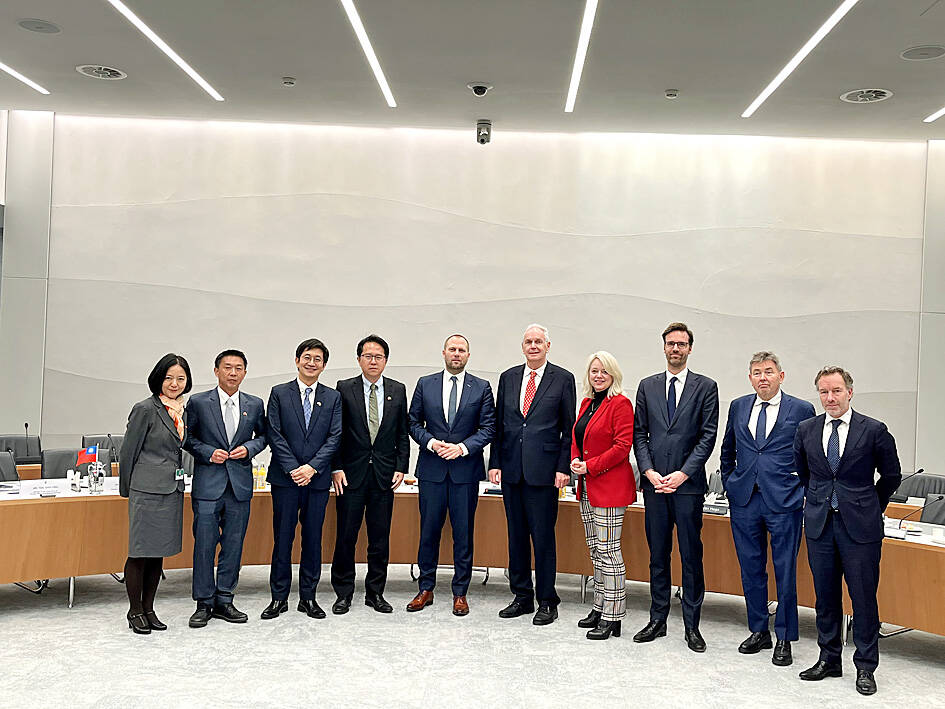A delegation of Taiwanese legislators was on Tuesday welcomed at the Dutch House of Representatives for the first time in history, where they exchanged views with members.
The meeting was “historic,” said Dutch lawmaker Rudmer Heerema, who hosted the delegation, comprising Democratic Progressive Party legislators Chiu Chih-wei (邱志偉), Hsu Chih-chieh (許智傑) and Tsai Shih-ying (蔡適應).
The Taipei Representative Office in the Netherlands said that the Dutch parliament made an exception in arranging the meeting, as it does not usually host foreign visitors during a voting session.

Photo courtesy of the Taipei Representative Office in the Netherlands via CNA
Heerema, chairman of the House Foreign Affairs Committee, and seven other Dutch lawmakers from across party lines showed interest in a wide range of issues related to Taiwan’s political and economic situation during the meeting, a video of the meeting showed.
They asked about the implications of the Russia-Ukraine war for Taiwan, relations across the Taiwan Strait, Taiwan’s ties with other nations in the Indo-Pacific region, and opportunities for cooperation between Taiwan and the Netherlands in the technology and semiconductor sectors, the video showed.
On the Taiwan-China issue, the Taiwanese legislators said it was important for the two sides to negotiate on an equal footing, and it was also necessary for Taiwan to build up its defensive capabilities to help avoid war.
If a democratic alliance can effectively resist Russia’s aggression in Ukraine, China would see it and not dare start a war in the Asia-Pacific region, Tsai said.
Chiu thanked the Dutch parliament for adopting six motions since 2019 that expressed support for Taiwan.
The motions included backing Taiwan’s participation in the WHO, Interpol and the International Civil Aviation Organization — organizations that do not include Taiwan because of Beijing’s objections.
Another motion urged the Dutch government to openly express its opposition to China unilaterally changing the “status quo” in the Taiwan Strait.

NATIONAL SECURITY THREAT: An official said that Guan Guan’s comments had gone beyond the threshold of free speech, as she advocated for the destruction of the ROC China-born media influencer Guan Guan’s (關關) residency permit has been revoked for repeatedly posting pro-China content that threatens national security, the National Immigration Agency said yesterday. Guan Guan has said many controversial things in her videos posted to Douyin (抖音), including “the red flag will soon be painted all over Taiwan” and “Taiwan is an inseparable part of China,” while expressing hope for expedited “reunification.” The agency received multiple reports alleging that Guan Guan had advocated for armed reunification last year. After investigating, the agency last month issued a notice requiring her to appear and account for her actions. Guan Guan appeared as required,

DAREDEVIL: Honnold said it had always been a dream of his to climb Taipei 101, while a Netflix producer said the skyscraper was ‘a real icon of this country’ US climber Alex Honnold yesterday took on Taiwan’s tallest building, becoming the first person to scale Taipei 101 without a rope, harness or safety net. Hundreds of spectators gathered at the base of the 101-story skyscraper to watch Honnold, 40, embark on his daredevil feat, which was also broadcast live on Netflix. Dressed in a red T-shirt and yellow custom-made climbing shoes, Honnold swiftly moved up the southeast face of the glass and steel building. At one point, he stepped onto a platform midway up to wave down at fans and onlookers who were taking photos. People watching from inside

A Vietnamese migrant worker yesterday won NT$12 million (US$379,627) on a Lunar New Year scratch card in Kaohsiung as part of Taiwan Lottery Co’s (台灣彩券) “NT$12 Million Grand Fortune” (1200萬大吉利) game. The man was the first top-prize winner of the new game launched on Jan. 6 to mark the Lunar New Year. Three Vietnamese migrant workers visited a Taiwan Lottery shop on Xinyue Street in Kaohsiung’s Gangshan District (崗山), a store representative said. The player bought multiple tickets and, after winning nothing, held the final lottery ticket in one hand and rubbed the store’s statue of the Maitreya Buddha’s belly with the other,

‘NATO-PLUS’: ‘Our strategic partners in the Indo-Pacific are facing increasing aggression by the Chinese Communist Party,’ US Representative Rob Wittman said The US House of Representatives on Monday released its version of the Consolidated Appropriations Act, which includes US$1.15 billion to support security cooperation with Taiwan. The omnibus act, covering US$1.2 trillion of spending, allocates US$1 billion for the Taiwan Security Cooperation Initiative, as well as US$150 million for the replacement of defense articles and reimbursement of defense services provided to Taiwan. The fund allocations were based on the US National Defense Authorization Act for fiscal 2026 that was passed by the US Congress last month and authorized up to US$1 billion to the US Defense Security Cooperation Agency in support of the